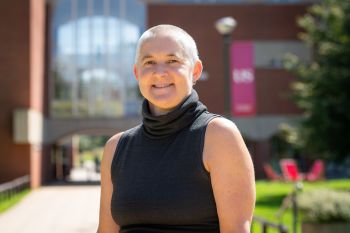Broadcast: News items
Placing education and student life at the heart of Sussex 2035
Posted on behalf of: Kate O'Riordan
Last updated: Wednesday, 31 January 2024

Kate O'Riordan, Pro-Vice-Chancellor for Education and Students
This term sees the next phase of the work building our strategy for the next ten years.
After conversations about our vision, mission and purpose, Sussex 2035 is being further developed through conversations about our core strategic areas: Education and Student Life; Research and Enterprise; Global and Civic Engagement.
As the recently appointed Pro Vice Chancellor for Education and Students, I am the lead on the core theme of Education and Student Life. This supports all aspects of education and student life, for students and staff, driving student experience and outcomes, and quality of offer. I am working with the campus community and the Education and Students Leadership Team to consider the challenges that exist, the changes we can make and the goals we want to reach. For more detail on any of the points below, you can read more on the context for this work in my accompanying discussion paper.
What challenges do we face?
There’s a wider perspective of issues confronting the sector as well as global challenges, including: environmental and political crisis; extreme inequality of life expectancy/quality and access to resources; disruptive technologies and technoscientific culture; instability across education and employment; break down in health and social care; rising health challenges, including mental health.
For Education and Students at Sussex specifically there are concerns that are specific to the University, which can be grouped under four themes:
- The composition of the University in terms of student numbers and staffing, type and mode of offer, and how we plan for growth – or not
- Our league table-indexed reputation which is most strongly linked to NSS and employability outcomes
- Mental health challenges – both a sector issue, but also specific to Sussex, which has the sixth highest in the country of students reporting mental health factors
- Disruptive and transformative technologies. For example, Artificial Intelligence (AI), a term currently used in reference to a group of generative, predictive, pre-trained technologies (mainly natural language interfaces and GPTs) which are disrupting academic conventions in higher education.
What should we change?
Based on the proposition in the vision for Sussex 2035 that:
Our education and student life provision will embed environmental sustainability, human flourishing, and digital and data futures in the curriculum offer, educational experience and outcomes, and the life of the campus.
In the context where students and staff feel that they are in the best place to realise their ambitions, can be themselves, do their best work, and in which diversity of background, identity, belief, thought, discipline, and method is understood to be foundational to our sense of community.
We need the following:
Capacity and capability for students and staff to flourish, nurture and create supportive educational communities, exercise critical hope, stabilise or mitigate crisis, improve quality of life for environment and people.
One approach would be to:
- Diversify offer, type and mode of education, whilst remaining clear about a campus-based offer
- Enhance the whole-institution approach to academic experience, engagement and outcomes
- Improve communication of wellbeing, residential and student advice services
- Connect leadership in technology and AI research to scholarship of teaching and learning, pedagogy and education
- Embed environmental sustainability, human flourishing and digital and data futures in the curriculum and life of the campus.
In terms of curriculum, this could be reached through an elective offer of linked modules that embed environmental sustainability, human flourishing and digital and data futures as distinct strands, and in synthesis; an applied or experience element for all students alongside or in synthesis with a core disciplinary specialism; experiential, applied, inclusive assessment modes for both discipline-specific and elective offer; selected diversity of award type and mode.
Where do we want to be in 2035?
- To have maintained and nurtured an underpinning structure of participation, development, quality assurance and educational enhancement
- To have delivered an inspiring diversified curriculum offer, built on disciplinary expertise, and delivered through a clear interdisciplinary framework, that engages the three drivers of change and builds global citizenship capacity
- To have provided excellence in quality of student experience, for both education and student life, based on clarity of offer and a focus on critical connections, belonging and relationships across campus and the region
- To have used these aims to drive excellence in outcomes; enhancement in reputation; and connection to prospective students, external partners and alumni.
So how do we get there?
I want to help curate a rich student experience through engagement with these drivers both in and beyond the curriculum, for example with open lectures, seminars and events, the Spirit of Sussex Award, and with external partnerships, mentoring and organising.
We need to build a network of connected relationships across staff and students through enhancing the role of USSU and the rep scheme, as well as partnerships, academic support and other forms of student-staff engagement.
We must also communicate and share achievements across the community through a student life communications strategy.
See Kate’s slides to find out more about how we can place education and student life at the heart of Sussex 2035.
How to find out more about Sussex 2035
- Visit our strategy webpages (you need to log in to see these). From here you can also read Sasha’s background papers: the first, Sussex 2035 Strategy Paper 1 is focused on the strategy development process while Sussex 2035 Strategy Paper 2 considers our values, mission and purpose, and vision.
- Email any thoughts, questions or insights to sussex2035@sussex.ac.uk

